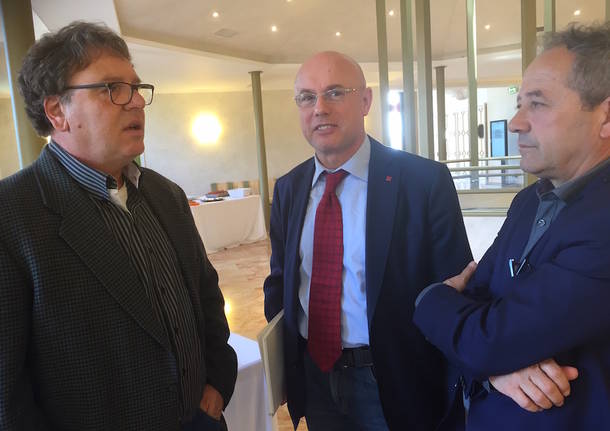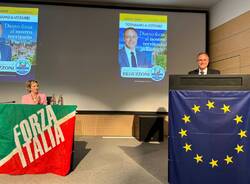Corporate welfare is no replacement for a salary
CGIL, CISL and UIL attended the UNIVA congress on welfare and bonuses, at Ville Ponti.

The three provincial trade union secretaries, Antonio Massafra (UIL), Umberto Colombo (CGIL) and Roberto Pagano (CISL), were in the front row at the congress organised by the industrialists, at Ville Ponti, on the topic of welfare and bonuses. They listened and exchanged opinions several times, especially during the speech by Pierangelo Albini, the Director of Work and Welfare with the Italian manufacturers’ association, Confindustria. (photo, from left: Roberto Pagano, Umberto Colombo and Antonio Massafra)
“The workers made a lot of sacrifices during these years of crisis,” said Umberto Colombo, “and in many sectors, engineering, for example, they guaranteed production even though the contract had expired. It was said, on several occasions, that there was no money to redistribute, but today, as we see signs of recovery, the contract should be renewed and the part of the salary that wasn’t paid in the recent past should be paid again. Welfare is fine, but it’s no replacement for a salary, or for the welfare state. The workers should be paid what they deserve, because they’ve earned it.”
Colombo was referring to the passage in which Pierangelo Albini pointed out that there is no wealth to distribute, but there is a need to cooperate to generate it. “The fact that welfare is negotiated in companies is fine,” Roberto Pagano added, “but we must be careful not to make people think that state welfare is no longer necessary, because when a worker leaves the employment market, he has to have welfare guaranteed, irrespective of whether or not there’s a contract in his former company. In Varese Province, we’ve come to some interesting company agreements, in this respect, but always keeping a reference to national bargaining.”
According to Antonio Massafra, of UIL, the heart of the problem is the failure to redistribute the wealth generated during the years of the crisis. “If 78% of the wealth produced by the country is in the hands of 20% of the population, that’s not right,” the UIL Secretary explained. “Just 15 years ago, this number was ten per cent lower, so the crisis has increased the difference between the rich and those who find it hard to get by. The companies have benefitted from the crisis, reducing costs, and have continued to produce while cutting jobs. This explains the increase in the wealth differential; now bargaining must rebalance this situation.”
TAG ARTICOLO
La community di VareseNews
Loro ne fanno già parte
Ultimi commenti
flyman su Ilaria Salis candidata alle europee con Alleanza Verdi Sinistra nel collegio NordOvest
Alberto Gelosia su Ilaria Salis candidata alle europee con Alleanza Verdi Sinistra nel collegio NordOvest
lenny54 su I no vax sono tornati a colpire in provincia: imbrattati i muri della redazione di Varesenews
malauros su I no vax sono tornati a colpire in provincia: imbrattati i muri della redazione di Varesenews
Felice su I no vax sono tornati a colpire in provincia: imbrattati i muri della redazione di Varesenews
PaoloFilterfree su A Varese Salvini prova a ricucire passato e futuro della Lega, ma Bossi non c'è

















Accedi o registrati per commentare questo articolo.
L'email è richiesta ma non verrà mostrata ai visitatori. Il contenuto di questo commento esprime il pensiero dell'autore e non rappresenta la linea editoriale di VareseNews.it, che rimane autonoma e indipendente. I messaggi inclusi nei commenti non sono testi giornalistici, ma post inviati dai singoli lettori che possono essere automaticamente pubblicati senza filtro preventivo. I commenti che includano uno o più link a siti esterni verranno rimossi in automatico dal sistema.